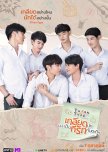
This review may contain spoilers
TharnType: Proof That Popular Doesn’t Mean Good
Rewatching TharnType after five years was like opening a time capsule, only to discover it’s full of mold. Back in 2020, this was one of the first BL series I ever watched. Without much to compare it to, I took it at face value and even enjoyed it. But now, after a hundred shows and a far better sense of what makes a compelling romance, I can finally evaluate it with the clarity of hindsight — and wow, does this not hold up.The love story? Nonexistent. The characters? Either baffling, morally questionable, or both. The fact that this show somehow got a sequel, one that dares to suggest the main couple stayed together for seven years, is comedy gold — except it’s not funny, just sad.
The “romance” rests on a foundation so flimsy it collapses under the weight of basic logic. In episode one, Type is established as someone with deep, long-term trauma. By episode… what, three? Four? He’s suddenly entertaining romantic interest in another man, as if years of suffering have been magically erased. Why? Because the script says so.
If this sudden shift had been toward a genuinely kind, respectful partner, maybe I could accept it — love can surprise you like that. But Tharn is not that partner. He bulldozes over Type’s boundaries, sexually harasses him despite knowing his past, and still ends up in his bed, because apparently consent is optional if the plot needs a push. Type’s bizarre justification — having sex with Tharn to “repay a debt” — raises deeply disturbing questions about how this show understands relationships.
And don’t get me started on the age-gap subplot. Adult Tharn pursuing a younger student? Disturbing. The backstory normalizing underage sexual relationships (Tharn and Tar) is even worse. These are not romantic quirks. They’re giant red flags that the show treats with alarming casualness.
Characters: Everyone Needs Therapy, Not a Boyfriend
Yes, Type is a jerk — arrogant, selfish, and in desperate need of anger management. But none of that excuses Tharn’s behavior. The real mystery is how Type, who initially resisted same-sex relationships so fiercely, somehow fought to keep this one alive. It’s a relationship built on unresolved trauma, power imbalances, and moments that feel more like coercion than romance.
The only bright spots here are Gulf as Type, Mild as Techno, and Kaownah as Lhong. Gulf, in particular, delivers a performance far better than the writing deserved, carrying scenes with emotional weight even when the dialogue is insulting to the viewer’s intelligence. No matter how good Mew is as an actor, I couldn’t stand Tharn. His presence in a scene had me bracing for yet another boundary violation.
Music? Forgettable. Cinematography? Bland. The show loves lingering, uncomfortable kissing close-ups and random shots of hands, as if those are a substitute for genuine intimacy. Scenes that should have developed the characters are replaced with raw, oversexualized moments that feel more voyeuristic than romantic.
Would I recommend this? Absolutely not. Especially not to viewers with trauma, bad relationship experiences, or just a low tolerance for toxic dynamics masquerading as romance. This isn’t a sweet love story you binge in a weekend; it’s a heavy, unpleasant slog that leaves you feeling more drained than entertained.
Score: 2/10 — and that’s only for the actors who somehow managed to stay afloat in this sinking ship. If you have to choose between TharnType and literally anything else, save yourself the headache and pick anything else.
Was this review helpful to you?

Leap Day: The Show That Stays With You
I started watching this series fully expecting a romantic subplot to develop between the main characters by the end.I'm so glad I was wrong.
I binged the entire thing in one day - didn’t even take breaks while working. I just sat there, devouring episode after episode. The storyline is one of the most intriguing concepts I’ve ever come across. The theme of day and night, of duality and balance, immediately made me think of Yin and Yang - and that’s exactly how the main characters felt. Night was the Yin: reserved, quiet, associated with darkness. Day was the Yang: warm, open, and tied to light. The execution was top-notch. I haven’t felt such a strong emotional connection to main characters in a long time. Their sorrow, fear, and sadness felt like my own - it all spilled off the screen so vividly.
As for the acting - absolutely spot on. Maybe I’m biased because I’m a huge fan of Gun Atthaphan and his talent, but he truly delivered here. As someone who is autistic myself - though I’m high-functioning, unlike Ozone - I still saw so many reflections of my own life in his character. That alone deserves praise. Gun’s portrayal was phenomenal and incredibly nuanced. There were moments when I genuinely forgot he wasn’t autistic - it felt that real. Pond and Dew also completely won me over. As Day and Night, they managed to convey everything they were supposed to, flawlessly. The rest of the cast did a great job too, but to me, Gun, Pond, and Dew were the brightest stars.
Coming back to my initial expectations about a romantic subplot - after watching the series, I believe the main characters are better portrayed separately rather than as a couple. This allows us to see them as two distinct individuals, rather than something meant to merge into one by the end. From start to finish, they exist as opposites, caring about different people and driven by different motivations.The relationships between the characters - especially between Day and Ozone - were deeply moving. Their bond was so powerful, I was often left in tears. The brotherly love and safe space Day created for Ozone touched me in a way that made it feel like he wasn’t just caring for Ozone, but for me too. The way they supported each other was absolutely beautiful. They stood out more than anyone else. No offense to Night and his girlfriend Dream, whose relationship was sweet and full of love, but for me, they were completely overshadowed by Day and Ozone.
As for the plot - great concept, decent execution, though the pacing left something to be desired. Some storylines were dropped too quickly, even though they had real potential to add conflict or depth. I won’t spoil anything, but I’ll just say this: the subplot involving Night, Dr. Wiwat, and the transfer was abandoned too soon in favor of redeeming Night’s character. I found some of Night’s decisions hard to understand, unlike Day, whose motivations were clear from the start and consistently well-written. The ending also felt a bit rushed and confusing - the resolution appeared out of nowhere in the final five minutes, contradicting earlier visions that said day and night had to meet, not separate. Still, it was a gripping and engaging series that hooked me like a fish on a line - and didn’t let go until the credits rolled.
The music and cinematography? Absolutely phenomenal. The costumes, set design - chef’s kiss. Especially the music, which brought the series to life in such a powerful way, perfectly enhancing every moment of tension, fear, joy, and sadness. The intro alone is stuck in my head and won’t leave.
To sum it up: this series is definitely on my rewatch list. Every minute I spent watching it was worth it. I truly hope we get more hidden gems like Leap Day in the future - it was a breath of fresh air and originality, something I, and many others, truly needed.
Was this review helpful to you?

A Heartwarming Comfort Drama for Tough Days
Cooking Crush is a truly great brain-off drama for tough days.The plot is simple, light, and pleasant in its concept – a comfort show about cooking and the sweet love that connects the main characters. The show has plenty of cheesy moments that made me grimace, but not necessarily for bad reasons. The story is uncomplicated: a boy with dreams of becoming a chef starts teaching cooking to a newly-met medical student who is working hard to become a good doctor. The romance develops quickly, yet naturally – despite the short timeline, it didn’t feel rushed. It’s a bit of a love-at-first-sight story, deepening with every dish prepared. The side plots are also simple, classic, and straightforward. Despite the abundance of clichés and slightly embarrassing situations, it was a good story that kept warming my heart throughout its run.
As for the cast, there were some good and some not-so-good choices. The main couple, Off and Gun, have that special something that makes it impossible for me to get bored with them. When their characters show affection, it feels genuine and pleasant to watch. Separately, they also hold their ground well – especially Off, whose portrayal of Ten only evoked positive emotions in me. He felt very natural, as if he was bringing more of himself than just the character. Gun’s Prem was a cute and determined guy, and his performance was also really enjoyable for me. The rest of the cast – well, it took me quite a while to warm up to them, like Ten’s friends, for example. The romantic subplot between Fire and Dynamite felt forced at first, but by the end of the show, it started to win me over.
Regarding visuals and music – I have no complaints. Apart from the absolutely cringy main song and the intro, which I couldn’t watch because of the overflowing secondhand embarrassment, everything else was really nice. Lovely costumes, especially for Ten, atmospheric interiors – nothing to criticize there.
To sum up, this is a good series that you can watch now and then for laughs and sweetness. It’s not gold on the level of Not Me, but it is everything a romcom should be. A perfect drama to have on your second monitor while cooking, folding laundry, or just curing a bad mood. I give it a solid 8/10, and I’ll definitely come back to relive Prem and Ten’s sweet love again.
Was this review helpful to you?

This review may contain spoilers
Not Perfect, But Perfect For Me – My Love Letter to "Theory of Love"
After watching Theory of Love three times over the course of five years, I can say with full confidence: this is my favorite drama. It is far from flawless – in fact, it has plenty of weaknesses – but love doesn’t grow out of perfection. Love grows out of authenticity. And that’s what this drama gives me: something real, warm, and endlessly comforting.Whenever I’m sad, Theory of Love consoles me. When I’m anxious, it calms me down. When I’m happy, it amplifies that happiness. It’s not just a show to me – it has become a safe space, a piece of comfort I know I can always return to.
The plot is built around film and cinematography, which makes it a true treat for movie lovers. Third, a third-year film student, is secretly in love with his best friend Khai. The problem? Khai is completely oblivious – and worse, a notorious playboy who changes girlfriends like clothes, all right in front of Third’s eyes.
The first episodes hit hard. We see Khai at his worst: selfish, careless, and utterly blind to how much Third is hurting. These early chapters are drenched in pain, disappointment, and hopeless love. They capture the cruelty of unrequited feelings in a way that is brutally honest.
Then the perspective shifts. Third finally gives up on Khai – and that’s when Khai’s world changes. For the first time, we see through his eyes. Slowly, painfully, he realizes he has always loved Third too. His womanizing was nothing but a shield, a distraction from the truth he didn’t want to face. Now that he sees it, he must fight to earn another chance. He doesn’t deserve it, and yet Third’s love hasn’t truly died. Against all odds, Khai is given one more chance – and this time, he takes it.
The ending is simple, symbolic, and unforgettable. It leaves us with a line that will stay with me for the rest of my life:
“For me, you're not a movie. You're real.”
The casting deserves its own essay. Every character feels perfectly chosen, every relationship carefully built. Off and Gun’s chemistry is legendary – electric, tender, and painfully believable. Supporting characters also shine, adding depth, humor, and warmth to the story without ever stealing the spotlight.
The emotions are delivered with raw sincerity. You believe every heartbreak, every smile, every glance that lingers too long. The secondary relationships are beautifully crafted as well: natural, gentle, and incredibly human.
The soundtrack deserves an award of its own. “Fake Protagonist” in particular captures the exact essence of the story – bittersweet, yearning, and powerful. The cinematography is filled with little filmic details and references, creating a world that feels both realistic and dreamlike. Altogether, the visuals and music build a space that feels warm, safe, and deeply immersive.
Objectively, this drama is not a 10/10. The pacing can drag, some character choices are questionable, and parts of the plot don’t live up to their full potential. And yet… for me, it is a 10/10.
Why? Because Theory of Love isn’t just a drama. It’s comfort. It’s a story that feels like home. It’s something I will return to over and over again, no matter how many flaws I can see – because love doesn’t care about perfection.
And I love this show. Truly.
Was this review helpful to you?

Bad Buddy: When Chemistry Becomes Art
I stumbled upon this series by accident while reading reviews for another drama on kisskh, where Bad Buddy was being praised to the skies. Of course, I couldn’t resist checking whether I had an overlooked gem right under my nose.It wasn’t a gem. It was a diamond — and Bad Buddy truly is one.
I sat down to watch with certain expectations. From bits and pieces of other reviews, I caught phrases like “Romeo and Juliet” and “Enemies to Friends to Lovers,” and those shaped what I anticipated from the series. While the drama didn’t quite follow that exact path, I can’t say I was disappointed — quite the opposite. The story is straightforward and uncomplicated, making it hard to mess up. Two sons of feuding families, raised from the start to hate and compete with each other. And yet, some invisible force kept pulling Pran and Pat together — overcoming not only the shadow of family rivalry but also the competition between their university faculties. It was truly heartwarming to watch Napat and Parakul, as if against the entire world, drawn to each other with a force as natural as breathing. Their relationship was genuinely beautiful, embodying the very essence of Boys Love — two boys falling in love. There were no “husband-and-wife” role divisions, no weakening one character to strengthen the other. They were natural and, most importantly, completely believable.
The casting? Absolutely perfect. Nanon and Ohm were nothing short of brilliant. It’s been a long time since I was so captivated by a performance as I was by theirs as a duo. Their dynamic, how perfectly they matched each other, their passion during the kissing scenes — simply sublime. I haven’t seen a BL pairing this convincing and this masterful in a long while. Every interaction felt purposeful; nothing was left hanging. Huge applause for these two — honestly, I’d clap for them for an hour straight if I could give them a standing ovation.
The supporting cast was equally solid. The Ink and Pa subplot was beautifully done — warm, comfortable, and charming. A well-executed yuri story is never a bad thing, and paired with the main male couple, it worked wonderfully.
Musically and visually — no complaints. The cinematography was pleasing, the soundtrack fit perfectly, and everything came together into a cozy, engaging series. The costume choices were spot on — Pat’s Hawaiian shirts were a highlight in themselves, and Pran’s fringe deserves special mention for adding a million charm points.
Would I recommend it? Absolutely, one million percent yes. I’ll definitely be coming back to this one more than once. This series is a true diamond — not 100% flawless, but still one of the best Thai BL dramas I’ve seen. It earns a solid 9.5/10.
Was this review helpful to you?




